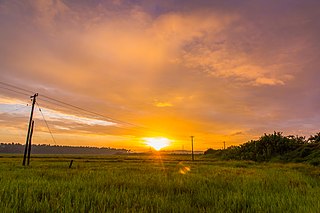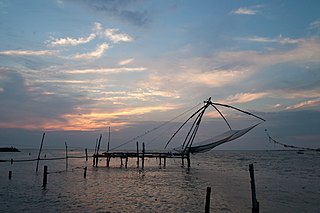Related Research Articles

Kottayam is one of 14 districts in the Indian state of Kerala. Kottayam district comprises six municipal towns: Kottayam, Changanassery, Pala, Erattupetta, Ettumanoor, and Vaikom. It is the only district in Kerala that does not border the Arabian Sea or any other Indian state.

The Kingdom of Travancore, also known as the Kingdom of Thiruvithamkoor, was an Indian kingdom from c. 1729 until 1949. It was ruled by the Travancore Royal Family from Padmanabhapuram, and later Thiruvananthapuram. At its zenith, the kingdom covered most of the south of modern-day Kerala and the southernmost part of modern-day Tamil Nadu with the Thachudaya Kaimal's enclave of Irinjalakuda Koodalmanikyam temple in the neighbouring Kingdom of Cochin. However Tangasseri area of Kollam city and Anchuthengu near Attingal in Thiruvananthapuram were parts of British India.

Ernakulam is one of the 14 districts in the Indian state of Kerala, and takes its name from the eponymous city division in Kochi. It is situated in the central part of the state, spans an area of about 2,924 square kilometres (1,129 sq mi), and is home to over 9% of Kerala's population. Its headquarters are located at Kakkanad. The district includes Kochi, also known as the commercial capital of Kerala, which is famous for its ancient churches, Hindu temples, synagogues and mosques. The district includes the largest metropolitan region of the state: Greater Cochin. Ernakulam district yields the highest revenue and the largest number of industries in the state. Ernakulam is the third most populous district in Kerala, after Malappuram and Thiruvananthapuram. The district also hosts the highest number of international and domestic tourists in Kerala state.

Idukki is one of the 14 districts in the Indian state of Kerala in the southwest of the country. It is the largest district in Kerala and lies amid the Cardamom Hills of Western Ghats in Kerala. Idukki district contains two municipal towns - Kattappana and Thodupuzha, and five taluks.

The Kingdom of Cochin, named after its capital in the city of Kochi (Cochin), was a kingdom in the central part of present-day Kerala state. It commenced at the early part of the 12th century and continued to rule until 1949, when the monarchy was abolished by the Dominion of India.

Thrissur, anglicised as Trichur, is one of the 14 districts in the Indian state of Kerala. It is situated in the central region of the state. Spanning an area of about 3,032 km2 (1,171 sq mi), the district is home to over 9% of Kerala's population.

The Kochi Municipal Corporation is the municipal corporation that manages the Indian city of Kochi in the state of Kerala. The Corporation manages 94.88 km2 of Kochi city and has a population of 677,381 within that area. It is the most densely populated city corporation in the state. Kochi Municipal Corporation has been formed with functions to improve the infrastructure of town.

Kochi is a city located in the Ernakulam District in the Indian state of Kerala about 200 km from Trivandrum, the capital of Kerala.

Parappanangadi is a major town and a municipality in Tirurangadi taluk of Malappuram district, Kerala, India. It is a coastal town located close to the Arabian sea.

Alappat Sreedhara Menon, known as A. Sreedhara Menon, was an Indian historian from Kerala. He is best known as the State Editor (1958–68) of Kerala District Gazetteers (1961–1975). He served as registrar of the Kerala University from 1968 to 1977, before retiring in 1980.

Park Avenue is a famous tree-lined road starting from the western end of Durbar Hall Road to Broadway in the city of Kochi, India.

Sir Rama Varma XIVKCSI (1848–1888) was the ruler of the Kingdom of Cochin from 1864 to 1888. He was the first Maharajah of Cochin to be knighted.
Thottakattu Govinda Menon was an Indian civil servant and administrator who served as the Diwan of Cochin kingdom from 1879 to 1890. He was the younger brother of T. Sankunni Menon. It was during his tenure that the border between Cochin and Travancore kingdoms was settled.
Thaikkattusery Sankara Warrier was an Indian civil servant and administrator who served as the Diwan of the Kingdom of Cochin from 1840 to 1856. His sons T. Sankunni Menon and T. Govindan Menon have also served as Diwans of Cochin.

Ernakulam Public Library is a public library in Kochi in the state of Kerala, India. Established in 1870, it is the oldest public library in Kerala. The library serves as the most important information store and cultural centre of Ernakulam and has a collection of several books on various subjects. This library contributed a lot to the social and cultural improvements of the city over the past three centuries.

Parukutty Nethyar Amma was the consort of the ruler of the Kingdom of Cochin, Maharaja Rama Varma XVI, who reigned from 1914 to 1932. She had been known as Lady Rama Varma of Cochin.

Aikya Kerala Movement, the movement to establish a united Kerala was one of the political movements in present-day Kerala state of India. The term Aikya Kerala literally means 'United Kerala'. It has been a statewide peaceful movement for a united Kerala state for all Malayalam speaking people, which lasted for more than three decades. Following the movement, The Malayalam-speaking regions of the Travancore–Cochin merged with the Malabar District and the Kasaragod Taluk of South Canara district in Madras State to form the modern Kerala state on 1 November 1956, according to the States Reorganisation Act, 1956 passed by the Government of India.
Chengalathu Cheriya Kunhirama Menon (1882–1939), also known by his nom de plume M. R. K. C., was a Malayalam–language author and journalist from Kerala, India. He was associated with prominent newspapers and periodicals such as Kerala Pathrika and Mangalodayam. Some of his famous books include Velluva Kammaran Allenkil Sardar Sheikh Ayaz Khan and M. R. K. C. yude Cherukathakal. M. R. K. C. along with Moorkoth Kumaran, Vengayil Kunhiraman Nayanar, Oduvil Kunhikrishna Menon, C. S. Gopala Panicker and Ambadi Narayana Poduval are regarded as the pioneers of the short story in Malayalam literature.
C. S. Gopala Panicker was a Malayalam-language short story writer from Kerala, India. Along with Vengayil Kunhiraman Nayanar, Oduvil Kunhikrishna Menon, Moorkoth Kumaran, Chenkulath Cheriya Kunhirama Menon and Ambadi Narayana Poduval, Panicker is regarded as a pioneer of the short story in Malayalam literature.

Oduvil Kunhikrishna Menon was a Malayalam–language poet, short-story writer, journalist and literary critic from Kerala, India. Menon was associated with the Venmani School of Malayalam poetry and was also a major figure in early prose literature. Along with Vengayil Kunhiraman Nayanar, Moorkoth Kumaran, Chenkulath Cheriya Kunhirama Menon, C. S. Gopala Panicker and Ambadi Narayana Poduval, Kunhikrishna Menon is regarded as a pioneer of the short story in Malayalam literature.
References
- Chelnat Achyuta Menon (1923). The life of T. Sankunnimenon, Diwan of Cochin, 1860-79. V. Sundra Iyer.